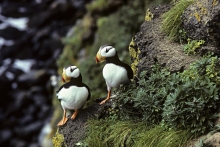"Hundreds Of Dead Puffins Are Mysteriously Washing Ashore In Alaska"
Climate change could be driving the seabird to starvation, amid reports of mass puffin die-offs worldwide in recent years. As oceans heat up, puffins have been dropping dead in droves across the globe. This year — on track to be the hottest on record — the Atlantic puffin population in the Gulf of Maine suffered its worst reproductive season ever. In 2013, The Associated Press described dozens of emaciated puffin carcasses washing up in the Gulf. Chick survival rates were plummeting and adults were starving to death, the report said.
That same year, more than 2,500 dead puffins were found on the shores of Scotland. In Iceland,home to more than half the world’s puffin population, colonies have been collapsing for years.
“Clearly something very weird is going on,” Julia Parrish, an ecologist at the University of Washington, told National Geographic. “It’s basically every year now we’re getting some huge mass-mortality event.”
And it’s not just puffins. Seabirds as a group appear to be especially vulnerable to changes in climate. “It’s our marine canary in a coal mine, if you will,” Rebecca Holberton, a University of Maine professor, told the AP in 2013.
Exactly how warming impacts these birds is not yet fully understood, but several factors appear to be at play. Climate-driven changes in wind could be impacting migration; many seabird species are vulnerable to temperature changes. In some cases, like with the puffins in the Gulf of Maine, extreme ocean conditions have washed away burrows of fledglings or destroyed habitats completely. But there’s one factor in particular that seems to be having the greatest impact: A lack of food.
Warming reduces the amount of basic food produced in oceans. Higher temperatures tend to result in fewer, smaller and less fatty zooplankton, the tiny organisms that many fish rely on for survival, according to Parrish. That, in turn, leads to less prey for seabirds.
“In the past three years, there have been massive die-offs of several different kinds of seabirds along the West Coast of the U.S. and in Alaska,” Parrish, who coordinates COASTT, a West Coast volunteer bird-monitoring network, told HuffPost. “The die-offs have spanned from San Francisco now up into the Bering Sea. And they have collectively killed perhaps a million birds.”
These mass deaths indicate “major shifts in the marine ecosystem” in the entire North Pacific, she said. “I am quite concerned that the ecosystem shifts associated with ocean warming are profound, lasting and very negative at least for some species.”
Read the full article in The Huffington Post

